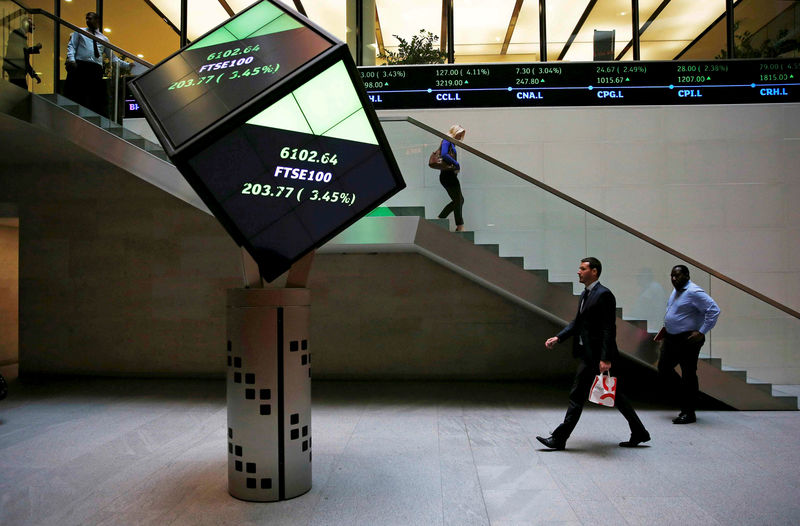By Sujata Rao
LONDON (Reuters) - Fresh sparring between Washington and Beijing over trade kept up pressure on world markets on Wednesday, with equities struggling and emerging currencies mostly weaker, led by the Indian rupee hitting a record low.
A bruising session in Asia took MSCI's main Asia-Pacific ex-Japan index to a 10th straight day in the red, its longest losing streak since September 2000.
Bourses in Shanghai, Hong Kong and Tokyo all closed lower, taking emerging equities to a new 15-month low. MSCI's all-country equity index inched up marginally, looking to extend two sessions of modest gains that had snapped six straight days of losses.
"What the market needs is a signal of some relaxation in trade rhetoric, a bit of climbdown," said Salman Ahmed, chief investment strategist at Lombard Odier. "That should be enough as (economic) fundamentals are strong. But you do need a trigger point and so far we have not seen it."
The months-long escalation in tensions between the world's two biggest economies shows no sign of letting up. President Donald Trump said on Tuesday the United States was taking a tough stance with China. That cemented expectations that new levies on Chinese exports will soon be announced.
Earlier China told the World Trade Organization (WTO) it wanted to impose $7 billion a year in sanctions on the United States in retaliation for non-compliance with a ruling in an earlier trade dispute.
Equity markets also faced pressure from U.S. two-year bond yields which touched a decade peak on Tuesday, partly spurred by data that provided yet more evidence of the U.S. economy's strength.
That data had pushed Wall Street to a strong close, led by tech and energy shares, and futures for the tech-heavy Nasdaq benchmark were up 0.2 percent on Wednesday. The S&P500 and Dow Jones indexes looked set for flat openings, however.
In Europe, a pan-European index rose 0.2 percent off recent five-month lows though it gave up earlier strong gains.
Ahmed said another positive catalyst for markets could be signals from the U.S. Federal Reserve that it could slow the pace of interest rate rises. But given the torrent of strong U.S. data, that looks unlikely - data this week showed U.S. small business optimism at the highest level on record.
"In 2015 when emerging markets got into a lot of trouble the Fed recognized the international spillover effect. This time that has not happened," he added.
UNDER PRESSURE
The trade rows and higher U.S interest rates have pushed an index of emerging currencies almost 7 percent lower this year. The yuan touched 2-1/2 week lows against the dollar, leading Asian peers lower and keeping the Australian dollar - heavily linked to Chinese trade - close to its lowest since February 2016.
The dollar inched down against a basket of currencies as hopes grew of concessions by Canada that would resolve disputes over reworking the North American Free Trade Agreement.
But emerging currencies stayed under pressure.
While the worst-hit Turkish lira and Argentine peso have steadied off record lows, the Indian rupee is continuing to plumb new troughs, taking year-to-date losses versus the dollar to more than 12 percent.
"The rupee ... is symptomatic of the overall situation in emerging markets, but it also embeds some idiosyncratic problems - with the fiscal deficit growing and the current account deficit widening on (the) back of rising commodity prices," said Cristian Maggio, head of emerging markets strategy at TD Securities.
Markets will also keep an eye on U.S. bonds. Ten-year yields stand just off the one-month highs hit on Tuesday after data showing sustained strength in the jobs market and the Treasury started a record debt sale amounting to almost $150 billion.
Political risk meanwhile returned to the radar of investors in Italy and Britain. Italian bond yields, which fell to six-week lows in recent days, rose after local media reported 5-Star, one of the parties in the ruling coalition, was demanding 10 billion euros in the budget to implement plans for a basic universal income.
The British pound also slipped off five-week highs hit this week against the dollar, as cautious optimism over a Brexit trade deal with the European Union subsided.

Oil prices extended Tuesday's $2 surge, with Brent futures close to $80 a barrel as Hurricane Florence advanced and U.S. sanctions started weighing on Iran's exports.